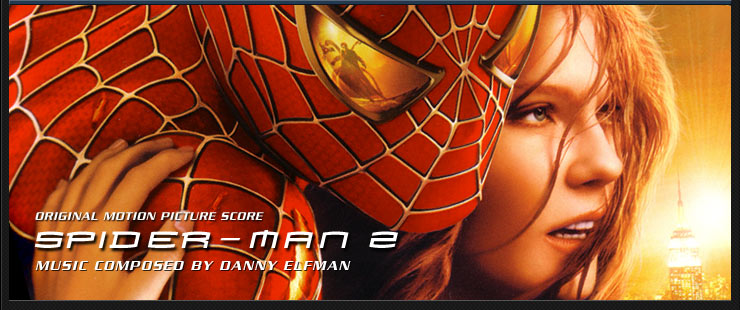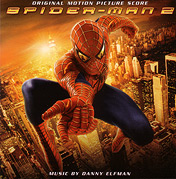
Review by Tim Perrine - He's back!! Danny Elfman, that is. I'll be up-front with you. From the instant I heard that swirling arppeggiation in the strings opening of the main titles of Spider-Man , I was hooked on Elfman's music for the film, and to this day, I still don't see how people could not like this score, or not be able to discern the thematic material Elfman crams into it. The music, while borrowing upon some tried and true Elfman devices, is as tailor-fit to the character as the Spidey suit. In my opinion, it's perfect. It takes a composer who's as energetic as Elfman to keep up with Spider-Man, and as heard with Spider-Man, Elfman had no problems. The score is so vibrant, so agile, always in motion, always modulating, can turn on a dime, carefully following Spider-Man around as he swings from building to building.
(The following paragraph contains music theory talk: read at your own risk, also keep in mind the analysis is purely my own.)
For those of you coming into the game late, there are four motives that represent Spider-Man. The first, and most prevalent is a collection of three pitches, the second a minor third above the starting pitch, and the third a perfect fourth above (e.g. – E, G, and A). This motive is the main motive for Spider-Man and Peter Parker, it literally is all over the score. Pay careful attention. Elfman takes this collection of tones as far as one possibly could. They appear in a multitude of variations, with some cues containing a long chain of them. The most common usually involves a return to the starting pitch (e.g. – E,G,A,E) The second motive, is the web-slinger motive- consisting of an ascending minor triad plus flat 6. (It's a little like his Batman theme) Elfman uses this almost exclusively when Spider-Man is in the air. Lastly, there's the "Great Power / Great Responsibility" motive, which is split in two. Let's say "Great Power" consists of a descending minor scale 8,7,6,5,3 (or E,D,C,B,G). "Great Responsibility" consists of an ascending arpeggiated minor triad, second inversion, moving down a half step to scale degree 2, moving back to the starting pitch. (e.g. A, D, F, E, A). The three tones of the main Spidey motive are tacked on at the end, played backwards and an octave above the starting pitch. Ok, if I haven't lost you yet, I will now: the love theme between Peter and Mary Jane basically is an inversion of the main Spidey motive. It consists of the second tone a minor third below the starting pitch, and the third a perfect fourth below…however, they're played out of sequence and the second and third pitches shifted up an octave. Phew, so in other words- the second pitch is a perfect fifth above the starting pitch and the third pitch a major sixth above. (e.g. – F, C, D) From there, Elfman uses a descending minor triad. Ok, enough of that. But you see, Elfman did put a lot of thought into these scores, and his economical use of thematic material is second to none.
(Ok, welcome back people who don't give a rat's ass about music theory. My point above is that the Spider-Man scores are tightly constructed thematically and motivically - more so than most people think.)
Spider-Man's score was so bright and vibrant, the heroic moments were totally awe-inspiring, while the softer moments so intimate and emotional. Spider-Man 2 is more of the same. It's very much a continuation of everything Elfman put into Spider-Man. Whereas Batman Returns experienced a shifting of tone away from the brooding nature of Batman, and Men in Black 2 was a beefed-up version of the original Men in Black, Spider-Man 2 seems relatively the same type of score as its predecessor - with only one change: there's a new villain this time. Doc Ock gets two themes, and they take center-stage in Spider-Man 2. The Green Goblin's theme was long and lyrical, as a contrast to the short Spider-Man motives. Elfman does something similar with Doc Ock. His primary theme consists of two phrases- the first one centering around a minor triad landing on flat-5- making it more of a diminished triad. This phrase presents a bold "Hey, I'm the bad guy!" statement, while the second half of the phrase (it's an altered version of the main Spidey motive with the third pitch only a half-step away from the second rather than a whole step, but I won't get into that) plays-up the sympathy we feel towards Doc Ock and his unfortunate situation. The second theme is the fun one. It's a physical musical representation of the character: eight notes, 2 pairs of pitches an octave apart played twice- the first time slow and heavy, the second quick and light. One note for each of Doc Ock's limbs (the first 4 notes for his tentacles and the second 4 for his real limbs)? I think so.
Elfman has a lot of fun with the Doc Ock themes and whenever he breaks them out, we get a taste of the madcap Elfman we all love from the late 80's/early 90's. The horns get to blare away whenever Doc Ock is on screen with the percussion musically creating the impact sounds of his tentacles breaking through brick and mortar as he ascends buildings. "Doc Ock is Born," "Doc Ock's Machine," and all the major action cues get the full Doc Ock treatment, and they are the main reason why you want to own the score album. Where the sing-song Goblin theme started to wear out its welcome in Spider-Man, I can't get enough of the Doc Ock material in Spider-Man 2. Elfman, as expected, plays around with the themes so much, they never get boring, and some of the variations are totally inspired. I particularly like it when he starts to really syncopate the themes throughout the "Saving May" cue. Incidentally, the music towards the end of that cue is so exciting, it makes you want to jump and cheer at the end when it finally resolves.
The film's other major set-piece (next to the finale) is the train fight, a cue on this album that wasn't used in the film. There's some great moments during the action portion, but oddly incorporates a lot of elements from the "Revenge" cue from Spider-Man. It seems to me like there was some temp track love turmoil on the sequel. In the film, there's much tracking, which isn't cool - although a lot of the tracking fits. I have a feeling that Elfman was ordered to follow the temp track containing bits from his original score, which for any composer is a nightmare. As many of you know, portions of this score were composed by John Debney, Christopher Young, (and probably Steve Bartek doing some re-working) due to Elfman having a busy schedule and unable to fix last minute edits to the film. I wonder if temp track love played a role as well in Elfman's departure… It's a shame too. The other unused cue "Aunt May Packs" is superior to the material that appears in the film, whereas Christopher Young's material for the train fight is actually pretty fun, fits well (maybe one too many horn blasts) and seems like a nice mimicking of the Elfman sound. It's a real travesty that Elfman's "Appreciation" portion of the train fight cue doesn't appear in the film, with some religioso choral passages as a pooped-out Spidey is carried by those he just saved. John Debney's portion isn't bad either. The "Pizza Delivery" cue in the movie is in a fun mock-heroic vein, albeit quite different from Elfman's sound. Neither the Young cues or the Debney cues are on the album.
For those of you wondering if the tracking in the film is contained on the album, it isn't, but there are many cues that are quite similar to cues in Spider-Man. For starters, the main titles are relatively the same. They follow exactly the same structure, with only one big change. Right before the full statement of the Spider-Man theme, Elfman breaks out his Doc Ock material. It's a total re-recording of the main titles, though. The orchestrations are a little different, but not much, and the tempo is different. "At Long Last, Love" is very similar to "Farewell" from the original Spider-Man - even right down to the tinkly bells all the way to the grand full/orchestra choral finale as we watch Spidey swing through the city one last time.
If it's a little disappointing to discover material in Spider-Man 2 a rehash of the material in the original Spider-Man, there's plenty of new music and brilliant re-workings of old material to make Spider-Man 2 worth the investment. The tender music here is so much more emotional than it was in the first one. A definite highlight is "A Phone Call" with the Spider-Man theme played expressively on solo piano. "The Mugging / Peter's Turmoil" is reminiscent of some of the softer cues in Spider-Man, in particular "Alone" but seems to have so much more weight this time, through thicker orchestrations. "Aunt May Packs" brings acoustic guitar into the score, a welcome change of instrumentation.
Those hoping for more awe with full choir will be pleased to hear there's just as much in Spider-Man 2 as there was in the original. "Spidus Interruptus" contains a moment of grandeur nearly unmatched in Elfman's Spider-Man music, with a fun handling of the "Interruptus" part of the cue. "He's Back" contains elements from the end titles of the original, only much, much bigger. The finale "Armaggeddon / A Really Big Web" is a decent finale cue. Elfman's use of choir as MJ makes her big discovery is fantastic, along with Spider-Man and MJ's escape from the scene.
Lastly, a nice surprise emerges near the end of the album in "The Goblin Returns." Yep, that sinister theme comes back, arguably eviler than ever with some fun little horn rumblings and an interesting electronic effect.
If Spider-Man 2 disappoints, it's because Elfman didn't (or wasn't allowed) to veer away from the material in the first Spider-Man. Many cues, while somewhat different, feel too similar to those found in the original. Of course, since the sequel is a continuation of the story with the same cast, crew, and production design, why should Elfman write something much different than what he composed for the first one? The problem for us, the listener, is the initial surprise and exhilaration from the first Spider-Man has worn away, making it much more difficult for Elfman to wow us a second time with similar material. Thankfully, Elfman is too inventive of a composer to allow things to get boring or stale, and the new Doc Ock material helps a lot. Many sequels contain scores that are tired, tired retreads of the territory the original score explored. This isn't so much the case with Spider-Man 2. There's enough differences between the two scores to make Spider-Man 2 a great companion to the original Spider-Man. But due to all the strange problems found in the score, it seems uncertain if Elfman will be back for the third installment, and that's unfortunate, as Elfman's music is more tightly weaved into these films than Spidey's webs themselves. Review by Tim Perrine (July, 2004) from Cinemusic.net.



Music Composed and Produced by Danny Elfman
Orchestrations by Steve Bartek, Edgardo Simone, David Sloanaker, Mark McKenzie
Additional Orchestration by Marc Mann
Orchestra Conducted by Pete Anthony
Recorded and Mixed by Dennis Sands at Sony Pictures Scoring Stage

Label (Catalogue): Columbia / Sony Music Soundtrax, (CK 92842)
Availability: In print
Purchasing options: Available at Amazon.com

Back to filmography index
|















